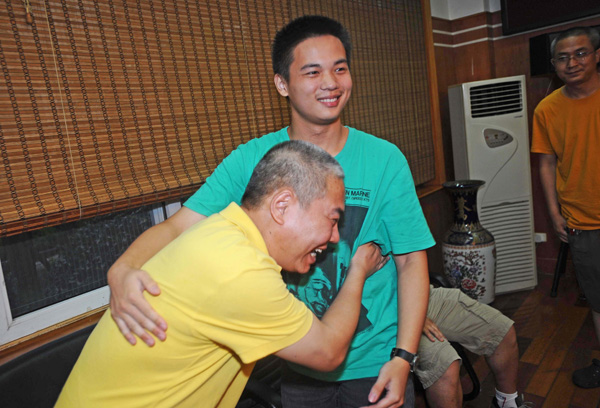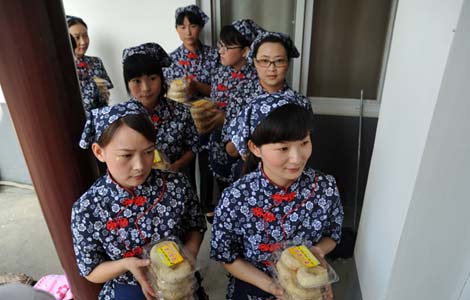Gaokao whiz evinces changing views
Updated: 2013-07-04 07:20
By Zhao Xinying and Lei Lei in Beijing and Zhou Lihua in Wuhan (China Daily)
|
||||||||
Huang Yiqing has become an Internet celebrity, not because he earned the top science score in the college entrance exam in Wuhan, the capital of Hubei province, but for what he subsequently wrote on Renren, a Chinese website similar to Facebook.
 |
|
Huang Yiqing (right) comforts his ecstatic teacher of physics Rao Kaihong as they celebrate his top science score in the college extrance exam in Wuhan, Hubei province. Miao Jian / for China Daily |
After learning his score for this year's gaokao, or college entrance exam, Huang wrote, "I have received praise from people all over the city, but I can't win your love," on June 26, suggesting he had been turned down by the girl he loves.
The confession divided netizens: Some offered understanding and support, while others voiced ridicule and criticism. What has interested people more, however, is the realization that gaokao champions are no longer deemed high in intelligence and good exam takers but lacking in emotion or more mundane interests.
Education experts said schools, teachers, parents and all of society have contributed to changing these high-achieving students.
"Different from the past, now the whole of society expects to see more versatile students with distinctive personalities, thus making teachers and parents pay more attention to the all-round development of students," said Cai Yanhou, a researcher on education at Central South University in Changsha, Hunan province.
"Besides, experienced teachers usually have a set of effective methods, which will help students master a huge amount of knowledge in a short time and get high scores in exams," added Cai. "So students have time for hobbies and other extracurricular activities."
Huang is one such example.
A graduate of Wuhan Foreign Language School this year, Huang earned a gaokao score of 682 out of 750. Although he scored well, he said he is not a diligent student and had never previously ranked first in an exam.
"I'm a fast learner and just studied efficiently at school," he said. "After school was my leisure time, when I played basketball with classmates and friends or listened to music, watched movies or played video games at home.
"If there is a secret to my success, I think it's my good attitude, for which I have to thank my parents because they seldom put pressure on me."
Huang said his school had encouraged students to develop hobbies and skills and organize student associations and activities. He took part in groups that focused on music as well as environmental protection, which he credits with helping him study.
For students a decade ago, it was another story.
Chen Lili, the liberal arts gaokao champion of Guigang, Guangxi Zhuang autonomous region, in 2006, remembers the hard time she had then, saying she was extremely hardworking, making full use of every minute to study. So were her classmates.
"At that time, we got up at six o' clock in the morning and studied till half past ten in the evening," Chen recalled. "Apart from some time for physical exercise, all of our time was spent on preparing for the gaokao during the third year of high school and we didn't have much time to develop our own hobbies."
Chen, who is now employed by a well-known domestic securities company, said she is glad to see more gaokao champions succeed with ease, but she said students of different eras may have different studying methods.
"I don't regret the painstaking efforts I took," Chen said, "after all, it was the hard work in those years that led me this far."
Wang Sunyu, a professor and educationist with Tsinghua University, said thanks to a focus on quality education in recent years, there are now more gaokao champions who are fully developed, both in intelligence and other life skills, rather than students who are only good at passing exams.
"Quality education as well as all-round development is good for a student," he said, explaining that hobbies can have a positive effect on study. "For example, the ways people get inspired by music and by math are alike, therefore students who play the piano often may find they are not bad at math.
"Also, students who enjoy reading philosophy or literature usually have a deeper understanding of humanity, which not only enables them to write thoughtful articles but is also good for their development."
Tang Shengchang, 71, a former principal of the prestigious Shanghai High School, said many Chinese high schools have been encouraging personal development among students for more than 10 years and the effects have been seen in recent years.
"We have witnessed a number of versatile gaokao champions who are good at both studying and playing in the past several years," he said.
"But the number of such champions is really high this year, indicating that the quality education in high schools of our country is going through a qualitative change."
More high-scorers are setting such examples.
Zhang Yunning, the liberal arts gaokao champion in Beijing, is good at playing the piano. When the gaokao results were released on June 23, China Youth Daily reported she was enjoying a concert in a theater. She also likes baking at home with her classmates.
Zhu Chenzhuo, who came first in science in Beijing, is reported to be a big basketball fan who played twice a week for his three years of high school. He continued with the sport even during his preparation for the gaokao.
"It takes me about two hours a day to finish my homework," Zhu was quoted as saying by China Youth Daily. "Then I spend my spare time doing what I like to do."

 July 4 in Prescott: Balance of grief, patriotism
July 4 in Prescott: Balance of grief, patriotism
 Jubilant crowds celebrate after Mursi overthrown
Jubilant crowds celebrate after Mursi overthrown
 Growth slowing for services
Growth slowing for services
 Venezuela eyed as Snowden seeks asylum
Venezuela eyed as Snowden seeks asylum
 Anti-terror drill staged in Xinjiang
Anti-terror drill staged in Xinjiang
 Memorial service held for 19 Arizona firefighters
Memorial service held for 19 Arizona firefighters
 Canada vigilant after terror plot
Canada vigilant after terror plot
 Beckhams' star power shines
Beckhams' star power shines
Most Viewed
Editor's Picks

|

|

|

|

|

|
Today's Top News
Obama, Merkel agree talks on surveillance program
Filipino executed for drug trafficking
Obama orders US to review aid to Egypt
Snowden still in Moscow
China urges more efficient uses of fiscal funds
Egypt army topples president Morsi
China to strengthen ties with Uganda
Frankfurt aims to be key yuan center
US Weekly

|

|






